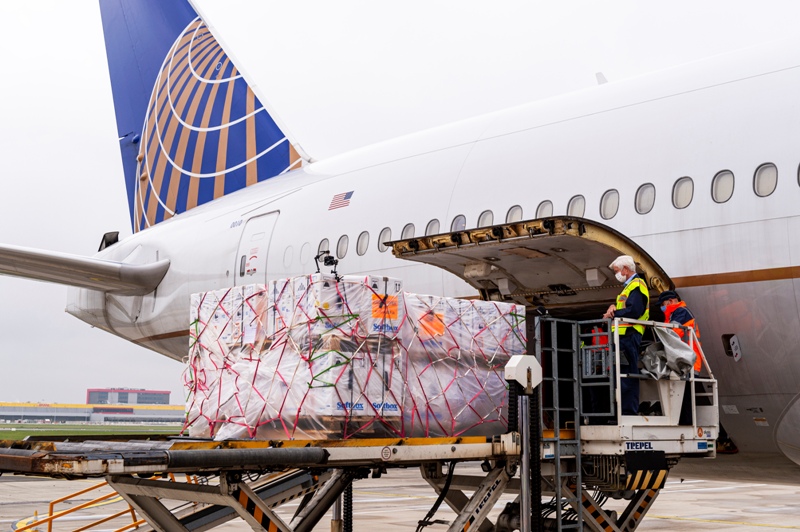US cargo carriers fly US Covid-19 vaccine shipments following FDA approval
14 / 12 / 2020

FedEx, United, American and UPS are among the airlines flying the first wave of US Pfizer-BioNTech Covid-19 vaccine doses following approval by the US Food and Drug Administration.
After months of preparation and close planning with Pfizer, other healthcare companies, and federal and state officials, the first Covid-19 vaccines are now moving to vaccination centers in the US, with distribution balanced among major cargo carriers, as part of Operation Warp Speed.
FedEx Express said it would transport the vaccine using its FedEx Priority Overnight service supported by FedEx Priority Alert monitoring.
“This is among the most important work in the history of our company and we’re honored to be a part of the effort to help end this pandemic,” said Raj Subramaniam, president and chief operating officer at FedEx Corp.
“I am immensely proud of our dedicated team members who continue to go above and beyond to help ensure the safe movement of these critical Covid-19 vaccines, especially during our busiest holiday shipping season to date. This is who we are and what we do at FedEx.”
United said it was the first commercial airline to fly the first FDA-authorized Covid-19 vaccines to the US. It noted a coordinated effort between cargo, safety, technical operations, flight operations and several other teams at United.
“On behalf of Pfizer, United operated five cargo-only flights in early December delivering Covid-19 vaccines from Brussels to Chicago,” the airline said.
“United has been proud to put our expertise to work over the last several months working with logistics and pharmaceutical companies around the world to bring Covid-19 vaccines to the United States.
“The scientists behind these vaccines and the frontline workers are the real heroes and we’ll continue to do our part in the weeks and months ahead to help get this precious cargo where it needs to go.”
UPS will move the Pfizer-BioNTech Covid-19 vaccine within the first days to states designated by Pfizer ased on orders received by Operation Warp Speed and Centres for Disease Control and Prevention officials.
The express giant said that vaccines will originate from storage sites in Michigan and Wisconsin and will be transported to UPS Worldport facilities in Louisville, where they will be expedited Next Day Air to select destinations, including hospitals, clinics and other medical facilities, to inoculate healthcare workers.
“Vaccine distribution is a key part of moving our world forward by delivering what matters,” said Carol Tomé, chief executive of UPS. “We have dedicated and hardworking people around the world who have been trained to store, handle, transport and deliver vaccines. We’re pleased to support our healthcare partners with smart, efficient logistics for these vaccines that will protect communities and save lives.”
American Airlines Cargo carried its first shipment of the vaccine last night. The airline received the shipment by truck at Chicago O’Hare International Airport (ORD) and loaded the shipment onto a Boeing 777-200 aircraft flying to Miami International Airport (MIA). The vaccine shipment will arrive at its final destination in a U.S. territory in the Caribbean later today.
“The American team is proud to be a part of the critical effort to get lifesaving vaccine safely and quickly to people around the world,” said American Airlines Cargo president Jessica Tyler. “We were able to mobilize within hours of getting the call to move thousands of doses. We know this is the first of many shipments to come, and we are ready to scale our operation as additional vaccine is produced and ready for distribution.”
American began conducting trial flights in November to simulate the conditions required to transport the COVID-19 vaccine, stress testing the thermal packaging and operational handling process to ensure it remains stable in transit.
The Pfizer-BioNTech Covid-19 vaccine is by no means an easy pharma shipment to handle as it must be kept deep frozen (at minus 70 degrees Celsius).
In order to maintain temperature dry ice is required, but there are limits of the amount that can be placed on an aircraft.
Ahead of the start of transportation, the US Federal Aviation Administration (FAA) issued dry ice guidance.
The FAA said In order to transport Covid-19 vaccines, operators may plan to carry dry ice quantities larger than quantities they may carry during typical operations. This volume of dry ice may present risks that existing mitigations do not adequately address.
It said that operators with an approved safety management system (SMS) must conduct safety risk assessments in accordance with their approved SMS.
Operators without an accepted SMS should conduct a safety analysis and apply appropriate risk mitigations.
The FAA recommends that operators consider the following information regarding the transportation of dry ice:
• Aircraft manufacturers provide information on maximum recommended dry ice quantities that the aircraft ventilation can accommodate, depending on the sublimation rate.
• An accurate determination of the dry ice sublimation rate is necessary to determine the correct quantity of dry ice that may be safely transported aboard an aircraft.
• As the dry ice sublimates, a loss of weight occurs, affecting the aircraft center of gravity.
• Dispatch with fully operational environmental control systems, including all air conditioning packs and auxiliary power unit (APU), to enable effective ventilation for ground operations and in flight contingencies.
• CO2 sensors installed or carried in the aircraft or worn by the pilots and other crew members will assist the operator and crew in recognising hazardous concentrations of CO2 and implementing effective risk controls.
• Pilot training on specific conditions and procedures can improve pilot decision-making in the event of a CO2 detector alert or other system abnormalities.
• Maximum ventilation, including during the ground de-icing and anti-icing process, will mitigate CO2 accumulation in the aircraft.














